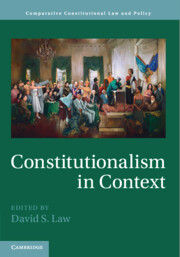Book contents
- Reviews
- Constitutionalism in Context
- Comparative Constitutional Law and Policy
- Constitutionalism in Context
- Copyright page
- Dedication
- Contents by Topic
- Contents by Region
- Figures
- Tables
- Contributors
- User’s Guide and Preface
- Abbreviations
- I Introduction to the Field
- 1 Introduction: Pedagogy and Conceptualization of the Field
- 2 The State of the Field
- 3 Methodology and Research Design
- II Concepts and Definitions
- III Constitutional Drafting and Revision
- IV Constitutional Adjudication and Interpretation
- V Rights
- VI Structure
- VII Challenges to Liberal Democratic Constitutionalism
- Index
- References
2 - The State of the Field
from I - Introduction to the Field
Published online by Cambridge University Press: 17 February 2022
- Reviews
- Constitutionalism in Context
- Comparative Constitutional Law and Policy
- Constitutionalism in Context
- Copyright page
- Dedication
- Contents by Topic
- Contents by Region
- Figures
- Tables
- Contributors
- User’s Guide and Preface
- Abbreviations
- I Introduction to the Field
- 1 Introduction: Pedagogy and Conceptualization of the Field
- 2 The State of the Field
- 3 Methodology and Research Design
- II Concepts and Definitions
- III Constitutional Drafting and Revision
- IV Constitutional Adjudication and Interpretation
- V Rights
- VI Structure
- VII Challenges to Liberal Democratic Constitutionalism
- Index
- References
Summary
Comparative constitutional law has experienced a resurgence in recent decades. Whereas two decades ago the field was focused on the North Atlantic and the issue of rights adjudication, there now exists a vibrant literature on many different jurisdictions and issues, covering a wide field of global constitutional arrangements. This chapter will review the history and rapid progress of the field of Constitutionalism in Context. The most encouraging and visible manifestations of this progress include a shift away from Eurocentrism and the traditional focus on apex courts. It will also identify lacunae in the existing literature and questions that would benefit from further exploration. This essay will conclude by proposing a next-generation research agenda for the field.
Keywords
- Type
- Chapter
- Information
- Constitutionalism in Context , pp. 23 - 40Publisher: Cambridge University PressPrint publication year: 2022
References
10 Suggested Readings
- 1
- Cited by

